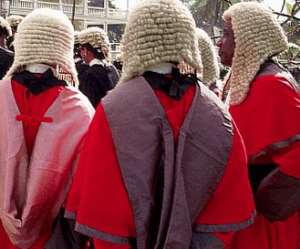
On July 28, 2021, the Cape Coast High Court (CCHC) found Honorable Joseph Gyekye Quayson “guilty of having not renounced his Canadian citizenship at the time of filing his Parliamentary nomination”. The Legislature did not do anything, and has not done anything, about it up till now. The Judiciary eventually barred a duly elected Member of Parliament from the Parliament House, belonging to the Legislature, from entering same, without fighting back.
On May 17, 2023, the Supreme Court of Ghana “ordered’ parliament to expunge the name James Gyekye Quayson as a Member of Parliament. What is the Ghana Legislature’s response? The Legislature obeyed the Judiciary without upholding the Constitution.
Honorable Joseph Gyekye Quayson should not have been outside of Parliament if the Legislature read, and applied, verbatim, a section of the 1992 Constitution of the Republic of Ghana.
How did we get here? I will put the blame on the Electoral Commission but first the inaction of the Legislature and the solution to this bullying. The applicable section of the 1992 Constitution is
94 (2) A person shall not be qualified to be a member of Parliament if he—
- owes allegiance to a country other than Ghana .
Honorable Quayson was not a Member of Parliament any time in his life until January 07, 2020 when he was sworn in to become a Member of Parliament representing the Assin North Constituency in the central Region. Respectfully, it was when he became a Member of Parliament that this particular section took effect.
What the Legislature must do (or should have done when the Judiciary barred Honorable Quayson from entering Parliament), is to have all elected, and sworn-in, Members of Parliament come to the House while the Speaker makes a roll call. This simple roll call will determine if any member is violating this particular section. The sheriffs sent to monitor the roll call will go and tell the Judiciary that none of the Members is in violation. If Honorable Quayson renounced his other Canadian citizenship before entering Parliament, then he was never in violation and he has been unfairly treated.
The question of how we got here.
If the framers of the 1992 Constitution intended anyone who “owes allegiance to a country other than Ghana” not to stand for election, the section would have read “A person shall not be qualified to be a candidate if he—
- owes allegiance to a country other than Ghana”.
A candidate standing for election is not a Member of Parliament consequently, not affected by the section in question.
Article 8 (1) of the 1992 Constitution states “A citizen of Ghana may hold the citizenship of any other country in addition to his citizenship of Ghana”. A candidate with multiple nationalities commits no crime for being a candidate.
Exploring, further, Article 94(2)(b), A person shall not be qualified to be a member of Parliament…. if he has been adjudged or otherwise declared—
(i) bankrupt under any law in force in Ghana and has not been discharged; or
(ii) to be of unsound mind or is detained as a criminal lunatic under any law in force in Ghana; or
(c) has been convicted—
(i) for high crime under this Constitution or high treason or treason or for an offence involving
the security of the State, fraud, dishonesty or moral turpitude
There is a possibility that a candidate may find himself/herself under 94(2)(b) after filing for nomination. Do we have some of these people in Parliament because they were not bankrupt, for instance, at the time of filing for nomination?
The Ghana Supreme Court, please came again. Per your ruling, is it allowed if a person obtains other nationality after filing for nomination? File for nomination, go bankrupt, and become a Member of Parliament. File for nomination, commit a crime of high treason and become a Member of Parliament.
A person can file for nomination while a case is ongoing in the Courts. A precedent is the Gbedemah case in 1969. Similar provisions barred Mr. Komla Agbeli Gbedemah from sitting as a member in the 1969 Parliament.
His eligibility to stand for election was not an issue at all, and he duly contested and won the parliamentary. He was, however, disqualified from being a member of Parliament and that was the interpretation in 1969. This particular section 94 of the 1992 Ghana Constitution is exact mirror of Article 71 of the 1969 Constitution which did not restrain Mr. Gbedemah from filing for nomination and contesting the 1969 election. In the case of Mr. Gbedemah, he was not cleared on October 01, 1969 during the first sitting of the chamber so was not qualified to be a member. In Honorable Quayson’s case, he was cleared and qualified on January 07, 2020.
The Electoral Commission’s (EC’s) attempt to educate contestants of the provisions of portions of the constitution on the Presidential and the Parliamentary Nomination Forms is mainly the cause of the Honorable Quayson and Mr. Adamu Daramani Sakande (may his soul rest in peace) debacle.
On the various nomination forms are reproductions of sections of the Constitution which seek to draw their attention to who qualifies for what. If prospective Presidential and Parliamentary Candidates do not know who qualifies to be what they are aspiring for, then they are not worth voting for, simply because they are ignoramuses who cannot sit in the law-making chambers of our country.
The definitions of being “eligible to be a member of Parliament” and to “qualify to be a member of Parliament” will be paramount. Eligibility is not the same as admissibility. If the Framers of the 1992 Constitution did not want dual citizens to stand for elections, they would have put them in Article 94 (3).
Mr. Quayson was not within the category of persons listed in Article 94 (3), so he was not ineligible at the time he filed as a candidate. It took me a while to find the definition of eligible, but it may be summed as ‘Meeting the necessary conditions required to participate in or be chosen for’. In other words, it is the right to run for office in elections. The framers of the 1992 Constitution made a clear distinction of who can stand for election and who can enter Parliament. Standing for election and entering Parliament are two different things.
Finding Mr. Quayson guilty of having not renounced his Canadian citizen when filing his nomination is an error in judgement. Mr. Quayson was eligible to stand for election as his circumstances at the time he contested is not mentioned in Article 94(3). The only Article that prevents Mr. Quayson from entering Parliament is Article 94(2)(a) A person shall not be qualified (matter of admissibility) to be a member of Parliament if he -
(a) owes allegiance to a country other than Ghana.
To qualify to be a member of Parliament is not the same as eligible to be a member of Parliament.
These provisions barred Mr. Komla Agbeli Gbedemah from sitting as a member in the 1969 Parliament.
Precedence thus ought to be followed, and if that is done, Mr. Quayson’s right to sit in Parliament as
Member of Parliament for Assin North will be laid to rest.
Moving forward, a look at Article 71 of the 1969 Constitution and Article 94 (2)(a) of the 1992 Constitution
brings up the same words “be qualified to be a member of….”.
Except the meaning of the words did change between 1969 and 2020, there should not be a different
interpretation. The Court in 1969 ruled on the fact that Mr. Gbedemah was not qualified to be in
Parliament. His eligibility to stand for election was never an issue; rather, his admissibility (qualification)
into Parliament was an issue. Circumstances can change between election day and the day one enters
Parliament.
Once elected, a holder of dual citizenship can renounce their other citizenship to satisfy Article 94(2)(a),
because there is a gap between election day and the day of entry into Parliament and one would have
ample time to renounce their other citizenship in a lot of instances.
Some political parties as well forced their prospective parliamentary candidates to renounce their other
citizenship even during primaries, which ought not be the case. After losing the elections most became worse off, having lost the right to go to Parliament and having forfeited the other juicy citizenship. The constitution does not prevent any one from contesting for both Parliamentary and Presidential elections as a dual citizen.
The requirement of being a Ghanaian by birth is only required when vying for the Presidency. Foreign born Naturalized Ghanaian citizens can run for elections as parliamentarians, renunciation of their other
citizenship is only required when they win the elections. The framers of the 1992 Constitution made
provision for all to participate so it will be unhelpful for somebody to try to change the rules in the
middle of the game.
The question the Judiciary has to answer is well-framed by Professor Kwaku Asare, aka Kwaku Azar, who writes “The law does not say anything about when this disqualification applies. Is it at the time of filing for the party primary, national election, voting day, or on the first day of Parliament?” The Ghana Judiciary has never answered this question but the Gbedemah precedent can gives us a clue; the Article takes effect at entry into Parliament, not any time before. Judiciary, come again.
This section needs to be interpreted into the various local languages for Nananom to help us.
Adverse decisions and threats to prevent the diaspora from helping solve the country’s problems are not
helpful.
Written by
Nana Osei Mensah Bonsu
(Migration and Citizenship Consultant)




 Pointing out the ills of NPP government not enough; tell us what you can do — Mi...
Pointing out the ills of NPP government not enough; tell us what you can do — Mi...
 April 27: Cedi sells at GHS13.78 to $1, GHS13.18 on BoG interbank
April 27: Cedi sells at GHS13.78 to $1, GHS13.18 on BoG interbank
 Worry about the furniture problem in basic schools; not how to paint schools in ...
Worry about the furniture problem in basic schools; not how to paint schools in ...
 Ramaphosa lauds ANC record as S.Africa celebrates democracy
Ramaphosa lauds ANC record as S.Africa celebrates democracy
 Ghana needs new counter-terrorism Act to tackle radicalised youth – CISA
Ghana needs new counter-terrorism Act to tackle radicalised youth – CISA
 Kumasi Central Prison triple its capacity to 1800 inmates
Kumasi Central Prison triple its capacity to 1800 inmates
 By-election: Ejisu is destined for NPP – Ahiagbah
By-election: Ejisu is destined for NPP – Ahiagbah
 Don't travel to volatile regions in northern Mali — Ministry of Foreign Affair t...
Don't travel to volatile regions in northern Mali — Ministry of Foreign Affair t...
 ILO’s claim of depleting reserves false, we have funds to pay pensions — SSNIT
ILO’s claim of depleting reserves false, we have funds to pay pensions — SSNIT
 Benin police fire tear gas to break up union protest
Benin police fire tear gas to break up union protest
